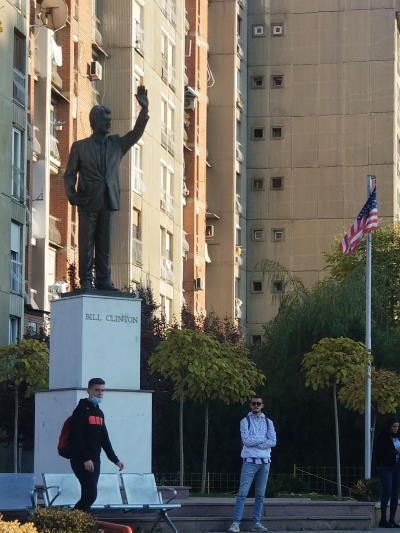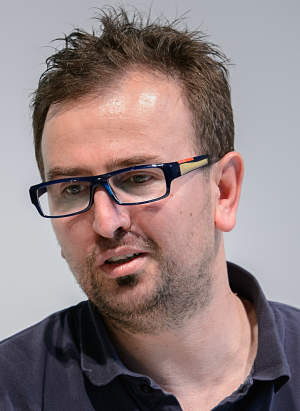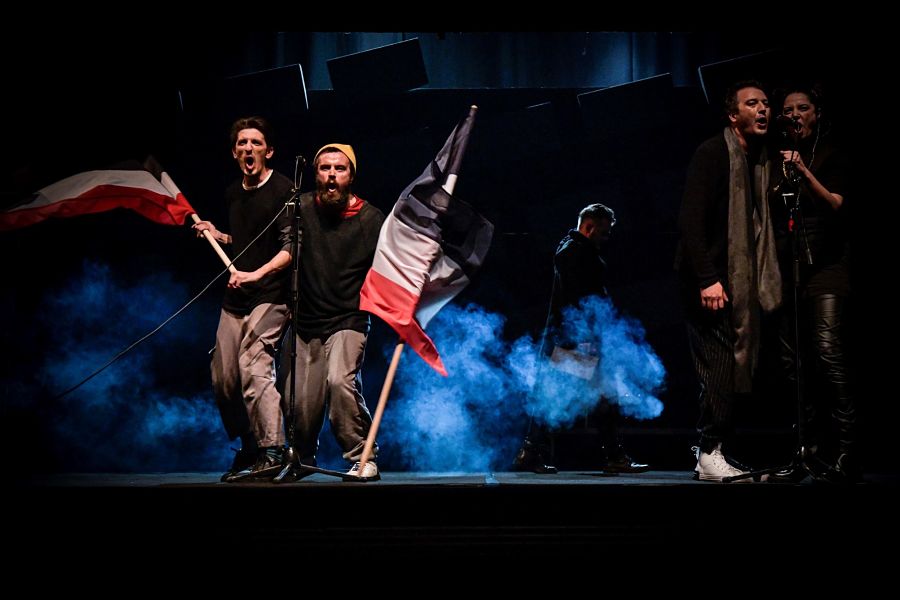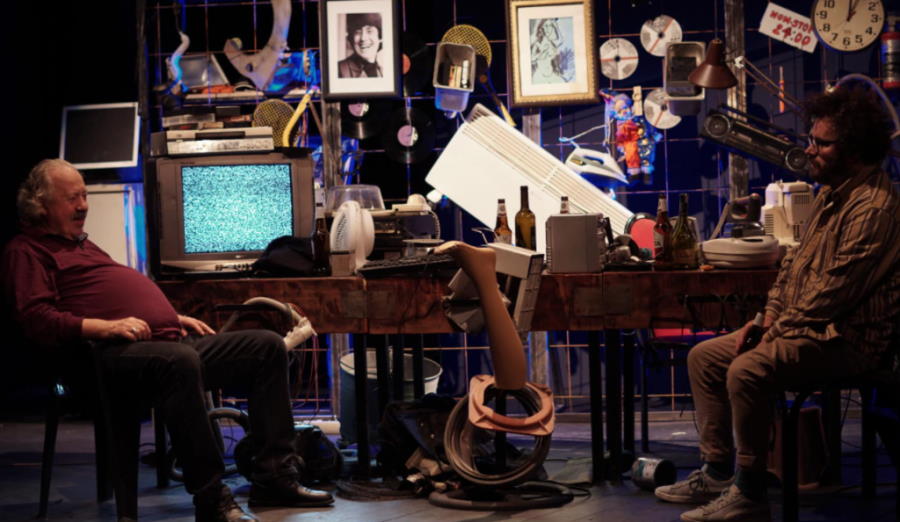Qendra Multimedia in Pristina, Kosovo, hosted the fourth edition of the Kosovo Theatre Showcase, an annual presentation of local and international performances, from Nov. 2 to 7.
This edition was an aberration from the norm, which was previously to offer a sampling of works from across the Balkans (and beyond), with a diversity of perspectives and styles. This year, however, the program was dominated by the works of playwright and festival co-organizer Jeton Neziraj (he/him). Seven of the festival’s 13 stage entries were penned by the prolific 44-year-old playwright, which lent the occasion the false impression of a vanity showcase. Festival organizers explained that in the two years of COVID, theatre production in the Balkans was all but suspended, so that they faced the conundrum of either reviving productions written by Neziraj, with easy access to the local actors and directors who had built those productions and in which they could ensure the quality worthy of an international showcase, or they could simply curtail programming. They chose the former—the right choice.
Neziraj is being positioned as the national playwright of Europe’s youngest country (declared an independent republic in 2008), in the tradition of Athol Fugard in South Africa and Václav Havel in the Czech Republic: the singular voice of a nation embroiled in political strife.
Fully cognizant of the presence of so many of Neziraj’s plays on the docket, other festival directors nonetheless showed up from the Czech Republic, Poland, and Italy, along with journalists from Turkey, Germany (including a German TV station), and the U.K. Particularly telling was the attendance of the current prime minister of Kosovo, Albin Kurti, to the premiere of Neziraj’s Oresteia adaptation, Balkan Bordello, which was held not in some ornate opera house but in a bunker that holds about 150 people. This, plus the presence of Dieter Topp, president of Kultur Forum Europa (a program of the European Union) to present Neziraj with its 29th annual award, underscored a wider European recognition of Neziraj’s contribution to Balkan culture, and the significance of his artistic voice.
Among the reasons Kultur Forum felt compelled to support Neziraj was the heat the playwright has taken inside Kosovo for being an insufficiently “patriotic” playwright, as his work tackles hypocrisy and corruption within his own country, as well as beyond its borders. He had been artistic director of the National Theatre of Kosovo from 2008 to 2011, until the government’s Ministry of Culture, resentful of his satirical take on Kosovar institutions in plays such as One Flew Over the Kosovo Theatre, which takes aim at the new government’s embrace of censorship and its appropriation of the arts, ironically tried to cancel the lampoon, albeit “unofficially.” This created an international incident, as the production was co-funded by different European governments (Germany, Austria, Switzerland, and Sweden). Shuttle diplomacy allowed the play to go on, and at its Pristina premier in 2012, local police and NATO soldiers guarded the theatre.
(One female Kosovar playwright told me that after a production opportunity for one of her plays opened up for her Belgrade, she returned home to some resentment that she had danced artistically with people from the “other side.” Since then, she noted, Neziraj has been instrumental in using Qendra Multimedia’s theatre and literary festivals to help bridge such divides.)
The city of Pristina itself grows on one: Amid many broken streets and sidewalks with car parts and appliances, there is a fruit and vegetable market that seems to go on for acres in a kind of extended bazaar. One of the city’s inner quadrants contains wide, tree-lined pedestrian promenades, punctuated by hotels, boutiques, restaurants, and cafés. Each day one hears the morning and evening calls to prayer. And while evidence points to some nationalistic postures (Muslim Kosovo, after all, was the victim of a genocide), I didn’t see signs of the kind of Nazi-adjacent craziness that continues to simmer in nearby Christian countries like Poland, Hungary, Serbia, Belarus, Croatia, and Germany. (I heard one rumor that Croatia was angling for a new war—just what the region needs!)
Perhaps you have the perception of many who have been around a while that the steady drift of Western democracies has been toward tribalism and its attendant animosities. If that drift in nations like the U.K. and the U.S. feels almost incomprehensible, it’s not a bad idea to study Ground Zero for balkanization in Europe, the Balkans themselves, where tribalism reached a genocidal pitch in the final two years of the 20th century. This year’s festival demonstrated how the theatre, with its blend of absurdism, cabaret, farce, and docu-tragedy, can turn a journalistic account of Balkan attitudes into a visceral, emotional experience—less explained than depicted, and felt through a wide range of emotions. All of this serves as a kind of canary in-the-coal-mine warning for all of us, as migration, national superiority complexes, and political and religious tensions—the prevalent themes of this festival—escalate across the U.S., Canada, and Europe.

A brief historical backdrop: Throughout 1998 and 1999, a series of war crimes was committed mostly but not entirely by the forces of Slobodan Milošević’s Serbian regime (Serbia is 85 percent Christian) against ethnic Albanians living in Kosovo (with its 95 percent Muslim population) and across other countries of the former Yugoslavia. Almost all of the plays in the Kosovo Theatre Showcase, 2021, whether or not penned by Neziraj, responded to the still raw wounds of that terrible war, as well as to the refugees sometimes still literally washing up on European shores. And then there are the reactions of the wealthy countries to this bouquet of human tragedy—reactions and policies that are themselves sometimes brutal, sometimes sensitive, implicitly arrogant, and usually expedient.
Throughout the 1990s, as Milošević rose to power, he banned ethnic Albanians in Kosovo from public education, erecting Christian churches on their Muslim turf, burning their towns, and finding new and creative ways to humiliate, then murder the locals. This led inevitably to calls for the independence of Kosovo, and to the rise of the Kosovo Liberation Army, in which a fellow named Hashim Thaçi was among the pre-eminent freedom fighters. It also led to the arrival of U.S. President Bill Clinton and First Lady Hillary Clinton to Kosovo in 1999, bringing the world’s attention to the plight of Kosovar refugees. It is widely believed here that it was Clinton’s intervention that led to the NATO bombings of the region that same year and ended the war. The Kosovans can’t praise the Clintons—and that era’s U.S. Secretary of State, Madelaine Albright, a Czech native—highly enough. An emblematic reference to Albright shows up in one of the plays in the 2021 Kosovo Theatre Showcase.
It took nine more years of U.N. supervision, until 2008, for Kosovo to declare independence from Serbia. Though it’s only been a country for 13 years, it’s already on its fifth prime minister and fifth president. Thaçi, the fourth president, was compelled to resign in 2020 after being indicted by the Kosovo Specialist Prosecutor’s Office for his own war crimes, committed under the banner of the Kosovo Liberation Army. These allegations include killings for hire, extortion of businessmen for his self-appointed government, and participating in an organized conspiracy to fund the Kosovo Liberation Army by trafficking in cocaine, heroin, and body organs.
If this whirlwind of recent history seems to you as macabre as it is absurd, if you can find bleak and sometimes outrageous humor circling the gratuitous cruelty and vindictiveness of these events, then you’re on the road to grasping the significance Neziraj’s plays, where on some deserted road in the Balkan countryside, Aeschylus meets Beckett meets Ionesco meets Havel.
And where are the women in this old boys’ club, you may ask? Discussions of gender equity haven’t arrived in the Balkans yet, Neziraj told me, the way they have in Britain and Germany—despite Kosovo’s current democratically elected president, Vjosa Osmani, being a woman. The voices of a few female Kosovar playwrights, such as Doruntina Basha and Agnesa Mehanolli, are being nurtured, but more so in London and Belgrade and London than in the Balkans themselves. That said, Neziraj’s most effective director is his wife, Blerta Neziraj, who directed four of the seven plays written by her husband. Let’s start with a sampling of those: Almost all of the plays performed in European languages were accompanied by English subtitles, translated by Alexandra Channing.

Balkan Bordello was actually performed in English, in Channing’s translation from Albanian—an international project produced by La MaMa Experimental Theatre Club in New York City (where it will be presented in the spring of 2022), in association with Qendra Multimedia; Belgrade (Serbia)-based Atelje; and My Balkans (New York and Belgrade). As such, its ensemble includes American, Kosovar, and Serbian actors.
Moreover, ODA Theatre, where it was shown, was converted from a dance club, itself restored from a bombed-out bunker. All of this renders this production of Balkan Bordello site-specific, since the play is a war-story Oresteia redo, seen through a Balkan lens.
The play is set in the early 21st century in the Balkan Express Motel, now a decrepit nightclub in a tacky style about two decades behind the times. Smoke effects and red lights shroud the onstage café tables where some of the audience sit. A singer (Valois Mickens) croons ballads as Clytemnestra (Onni Johnson) awaits the return of hubbie General Agamemnon (George Drance) from the U.S. invasion of Iraq. He swaggers in, hauling his war prize Cassandra (Verona Coxha) like a sack of potatoes over his shoulders, before dumping her onto the floor. She cowers under a cocktail table, dreading the next abuse. A gay couple punctuate the gender politics amid the ambient grievance politics. Of course Clytemnestra and her boyfriend Aegisthus (Svetozar Cvetković) will soon murder Agamemnon, in revenge for his sacrificial killing of Iphigenia (Agamemnon and Clytemnestra’s youngest child), a killing he undertook without consulting his wife in order to obtain favorable winds from the gods, thus enabling his fleet to sail to and sack Troy, or Baghdad. Either historical site is fine: The theatrical language is as allegorical as it is lyrical. The soldiers swagger, and the shedding of blood always warrants revenge.
The sacrifice of Iphigenia provides some connecting tissue to Neziraj’s A.Y.L.A.N., produced and performed at the Gjilan City Theatre. Though Blerta Neziraj’s direction supports her playwright-husband’s metatheatre puckishness, the play packs an emotional wallop nonetheless. Performed in Albanian, it narrates the discovery in a Sicilian coastal town of a corpse that has washed ashore. The townsfolk create a news event out of the cadaver, hoping it’s the harbinger of a refugee onslaught which has, thus far, passed them by. Because with refugees comes financial aid and the golden promise of corruption.
In story theatre style, six marvelous performers (Aurita Agushi, Ernest Zymberi, Kushtrim Qerimi, Tringa Hasani, Gani Rrahmani, and Alban Shahiqi) narrate the saga, along with stage directions and scene headings. In one of the play’s many jokes, the narrator names a sequence of scenes by number—worthy of skipping because nothing happens in them.
Disappointed that no refugees are interested in their town, the locals toss the corpse back into the sea. And this is where, with Tomor Kuci’s, lugubrious sound design and Gjergj Prevazi’s soulful choreography, the Ionesco-tinged comedy gently transforms into something ethereal. The corpse slides and tilts upside down, until we see only a pair of legs sinking, sinking into a watery grave between the rows of seats.
We’re later told of refugees on a boat that, to reach shore, must sacrifice one of its passengers. A father chooses his infant son—echoes of Agamemnon and Iphigenia. There’s a press photograph of an infant Kurdish boy washed ashore, face down in the beach. In a place where the response to the suffering of refugees has grown indifferent, this play’s emotional impact is as heartbreaking as it is enraging.

Karl May remains a popular German novelist from the turn of the 20th century; he was a favorite of Hitler for his racist tropes about Albanians. Neziraj’s The Return of Karl May (performed at the Kosovo National Theatre in Albanian)—and co-produced by Qendra Multimedia and Volksbühne Berlin—is a furious, farcical, metatheatrical lampoon of European arrogance and bigotry. The premise is that the National Theatre of Kosovo is rehearsing a play to take to the Volksbühne Berlin (to rescue the flailing German theatre as only a Balkan troupe can—a playful joke) in which one of May’s leading characters, “a man without a heart,” travels with a frog from Kosovo to Germany, grappling with various border crossings.
For the play-within-the-play, there is no script, so the actors and directors hash out the scenario and bicker as they devise something plausible. Explains the director (in a high-octane, whiplash performance by Adrian Morina): “The idea is that the Germans, and the Europeans in general, but especially the Germans, struggle to see us any differently to the way we’re portrayed in Karl May’s fantasy. To the Germans we are like bandits, cold-blooded killers, vengeful, thieves, savage, brutal, ignorant, fanatical Muslims, frauds, impulsive, untrustworthy…”
Neziraj’s play, also directed by Blerta Neziraj, includes a merciless takedown of Austria’s Nobel-winning author Peter Handke. After receiving the award, the revered Handke kept dodging questions about his support of Milošević, underscoring Neziraj’s point about the simmering ongoing racism of the European Union’s wealthier nations.
Audience by Václav Havel (ODA Theatre) is not written by Havel but by Neziraj, in Albanian. Yet he channels Havel’s aesthetic. Cleanly staged by Agon Myftari, it’s an etude for two actors (Shpëtim Selmani and Dukagjin Podrimaj, riveting), set in a dressing room of a theatre before the opening of Havel’s play. A local police inspector (Podrimaj, infused with a scintillating blend of self-deprecation and condescension) bandies around the word “investigation” to the harried director (Selmani) without saying what exactly he’s investigating. Meanwhile, a company actress with whom the investigator is obsessed laughs and sobs offstage. A pair of cocaine-fueled, homoerotic fever dreams lend a surreal lens to the mercurial power dynamic between the government official and theatre director.

Were there any entries that did not involve refugees or politics? Yes, and, predictably, they weren’t penned by Neziraj.
Shades of early Mamet informed Shpëtim Selmani’s Fuego, produced by and presented in Albanian by the City Theatre of Ferizaj. Audience and actors were all positioned on the theatre’s stage for a play that could have been called Kosovar Buffalo. Set in a junk shop, the play had uncredited set design which included an ancient cement mixer, spin dryer, and refrigerator, with other appliances hanging from the walls.
Another marvelous acting duet (director Selmani and Bajrush Mjaku), Fuego depicts the plight of a fellow (Selmani) simply wishing to retrieve and pay for an old electrical heater that he left for repair. Mjaku (a local star) plays the shop owner: a hefty, silver-haired, imposing presence who relishes toying with his younger customer, insisting that he has no change for his customer’s €5 note, but that his son can bring the change if the customer will simply wait. The customer is torn—he doesn’t care about the change, he says, and yet he remains, as though in a Beckett play. The dryer and cement mixer eventually spin and clatter with the crashing sounds of the power tools the owner has placed inside them, and the customer winds up locked in the fridge. The question (by the rules of psychological realism) is why the guy doesn’t just leave when things turn surreal. But his inability to do so, from a Balkan perspective, is the point, creating a tension between plausibility and metaphor. Fadil Hysaj directs.
Domestic bleakness permeates the family in Ivor Martinić’s Birthday, directed by Ilirjana Arifi, produced by and presented in Albanian at Dodona Theatre in Pristina. A man in a wheelchair is “celebrating” his 25th birthday; family and friends bring balloons that pile up in one corner of the stage, creating an ironic picture, as they chirpily discuss life’s missed opportunities. The set is a barebones depiction of a kitchen—the man’s mother is perpetually stirring batter in a bowl. The very good ensemble (Rebeka Qena, Labinot Raci, Igballe Qena, Bislim Muçaj, Sheqerie Buçaj, Florenta Bajraktari, and Alketa Sylaj) perform in a style of kitchen-sink realism. In a private moment, the birthday boy masturbates a young woman who adores him, yet her affection for him is unrequited. Moments of tenderness recall British playwright Shelagh Delaney’s 1958 A Taste of Honey. These people are cheerfully going nowhere.
Indeed, one cannot argue for a moment that these Balkan writers display anything approaching optimism. Why should they? In the Epilogue of Balkan Bordello, Pylades calls out the following choreography, which sums up the view of this entire festival, and of Balkan history, which can be extrapolated well beyond Balkan borders: “One step forward, two steps back. One step backward, two steps forward. Now raise the right hand. The left hand curves below…Twist the pelvis counterclockwise: a small jump up, and one, two, one, two…Pirouette!”
Steven Leigh Morris (he/him) is a playwright, journalist, and novelist. He currently serves as director of the play development program PLAY LA and hosts “Animal Farm,” a weekly talk show about theatre and politics.


